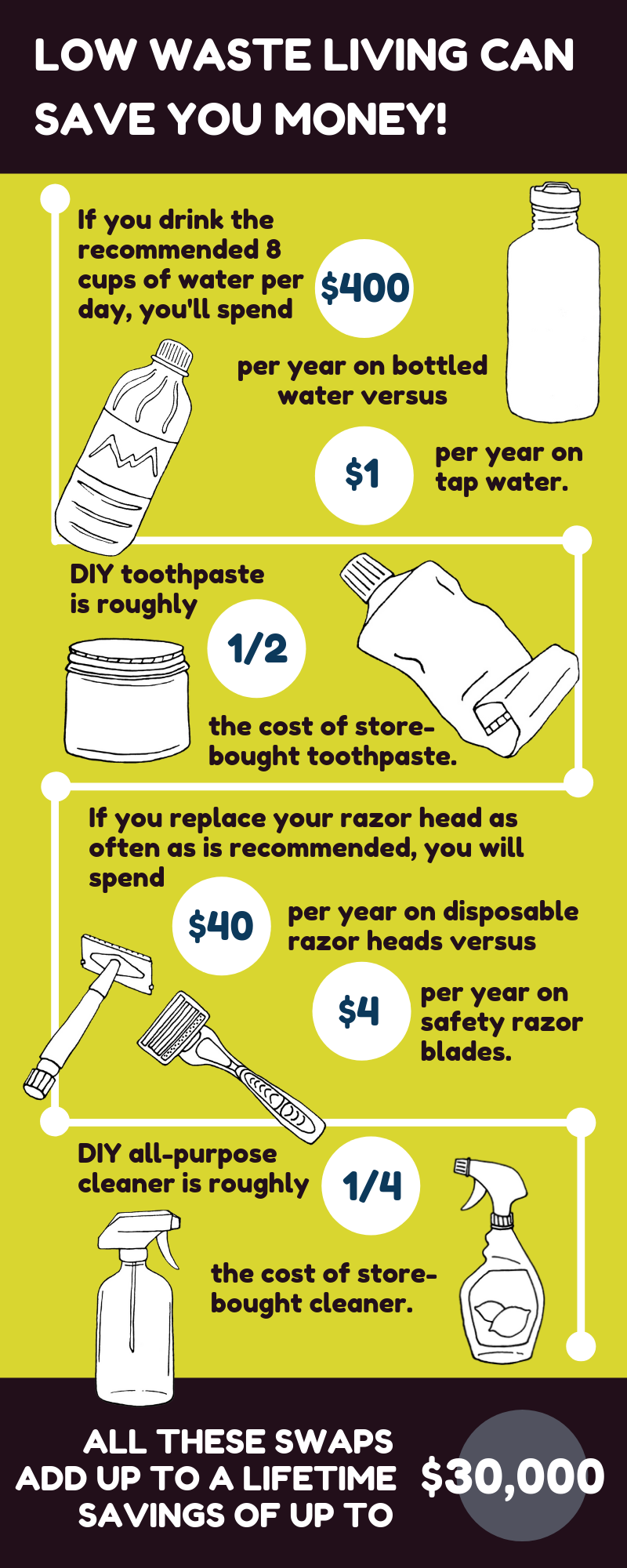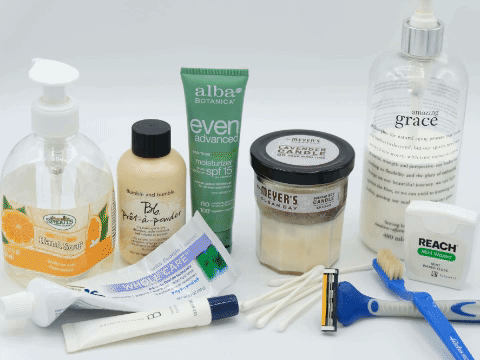While there’s a lot of hype around the zero waste/low waste movement right now - and for good reason - we know that the thought of overhauling your life and changing so many of your habits can be pretty overwhelming.
At Way of Being, the goal is not perfection. We are all about trying our best -- one day and one low waste swap at a time -- in whatever ways are manageable for each of our lifestyles, budgets, cultures, and time constraints. There are so many great ways to make a difference with simple but impactful changes, and we want to help make those changes easier and more accessible for you.
A lot of us care deeply about reducing our harm to our environment, our communities, and our bodies, but haven’t yet taken the steps to do so. In case you could use a little push, here are some short term and long term benefits to adopting a lower waste lifestyle.
Immediate & Short Term Benefits
1. Save Money
There’s a bit of a misconception that living a zero-waste lifestyle has to be more expensive than conventional options, but quite the contrary! Many, if not most, of the simplest swaps actually save you money! And we are all about those win-wins.
Avoid the cost of buying disposables when you switch to a reusable version.
 Buy produce sans packaging. Buying pre-cut, packaged produce might save time and add major convenience, but the added cost and waste is undeniable. If you have a farmers market in your area, they tend to offer the best prices for produce since you’re buying directly from the farmer and avoiding additional markup from the grocery store.
Buy produce sans packaging. Buying pre-cut, packaged produce might save time and add major convenience, but the added cost and waste is undeniable. If you have a farmers market in your area, they tend to offer the best prices for produce since you’re buying directly from the farmer and avoiding additional markup from the grocery store.
Get a discount for bringing your own cups or bags. Many grocery stores, as well as coffee and juice shops, will give you anywhere from a 5 cent to 25 cent discount for bringing your own bags or cups. Some grocery stores even give you a discount for each reusable container or bag you use -- like Market of Choice, Trader Joes, Sprouts, and Whole Foods.
*Starbucks offers $0.10 off when you bring your own cup. If you drink a Starbucks coffee 5 times a week, you will save $26 and divert 260 disposable cups from the landfill in just one year!*
Shop at second-hand shops instead of purchasing brand new items. It's budget-friendly and helps conserve the energy and raw materials harvested to produce something from scratch. Many consignment shops specialize in carrying on-trend, designer, and lightly used items, so it can be surprisingly easy to find products -- from clothes to shoes to furniture -- that fit your style and don’t smell like mothballs.
Cooking at home instead of eating out helps you avoid disposable (and often difficult or impossible to recycle) containers and utensils and saves you money. According to the U.S. Bureau of Labor Statistics, the average American household spends $3,000 on eating out per year. Restaurants mark up their food about 300% percent of the cost, according to PlateIQ, so making the same meal at home can cost significantly less.
You might even reduce the amount of waste you produce at home so much that you can cancel or reduce your curbside trash pickup service!
2. Simplify (& Beautify) Your Life

Many of the habits associated with a low waste lifestyle encourage you to slow down, be intentional about the impact of your actions, and pare down things that you might discover are unnecessary. For example, if you stock your home with ingredients to make DIY cleaning products and skincare, not only is it super easy to refill when you run low on something, it’s also really refreshing to see a cabinet free from the labels and ingredient lists full of mysterious chemicals. Not only refreshing but kind of beautiful, right?? It can also add convenience, cut down on trips to the grocery store, and reduce clutter!
3. Feel More in Control
One of the powerful benefits of practicing a low waste lifestyle is that all of those active decisions can help you feel a stronger sense of control in your life! Do you get overwhelmed by all of the negative things happening in the world and find yourself feeling kind of powerless? Or do you ever get frustrated that it feels like there’s no way to completely opt-out of all the ways we indirectly harm ourselves, our environment, and our fellow human beings? Well, you’re definitely not alone in feeling that way, but in reality, we aren’t powerless at all!
There are plenty of things big and small that we can do to make a difference, especially if more of us start doing them. It can be so liberating to know that you spent even a day doing as little harm as possible.
Not So Long-Term Benefits
4. Reduce Harmful Chemicals in Your Body
Ok, you know we couldn’t get very far in this post without bringing up plastic. To be fair, plastic is really helpful in many ways. There’s a reason it’s in practically everything, right? From toys to medical equipment, clothing, carpet, pipes, and, of course, packaging. The thing is, for as much as it’s in everything, you’d think it would have to be pretty safe, but… it’s just not.
According to the Center for Disease Control, 93% of us have BPA in our systems as a result of frequent exposure, and it’s not doing us any favors. Some of the most common plastics, including BPA, have been proven to be carcinogenic and endocrine-disrupting, leading to reproductive issues, birth defects, cancer, and impaired immunity.
Even if a label says something is BPA-free, BPA isn’t the only type of plastic chemical with harmful effects. Alternatives to BPA are constantly being developed and implemented before we’re able to test the long-term effects on our health. Minimizing the plastic in your life and the lives of your loved ones will do your body some serious good.
5. Reduce Harmful Chemicals in Our Environment
We’re not done with plastic yet. The ways we create it and dispose of it can also have impacts that will affect us and our environment in the long term and short term. Not only does the process of producing plastic contribute to toxic air pollution, what we do with it after its often very short use life has a variety of implications.
Only 9% of the 8.3 billion metric tons of plastic we’ve ever produced has been recycled. 79% has ended up in landfills or is floating around the planet as litter. When it ends up in landfills, many of those toxic chemicals seep into the ground, contaminating the groundwater and our other water sources. The 8 million metric tons that end up in the oceans every year poisons wildlife, causing harm to us when we consume them and long-term damage to those ecosystems. 12% of the plastic we’ve produced has been incinerated, which can help produce energy but also emits greenhouse gases and toxic pollutants into the air.
Long story short, there’s no clean, harmless way to dispose of plastic at this point.
Even the process of recycling takes energy (often not so clean energy - 73% of our electricity in the US comes from fossil fuels, 20% from nuclear power, and only 17% from renewables), so while it might be our best disposal option, reducing our plastic use and production is the best way to limit the havoc it wreaks on our planet and bodies.
6. Preserve the environment for future generations
Our planet has so many treasures that we simultaneously cherish for their beauty and take for granted as being seemingly permanent fixtures. Many of us have probably already seen the impacts of climate change on some of our favorite places and are eager to save them.
Aside from being a major eyesore, our waste has dramatic impacts on the health and sustainability of many plant and animal species, as well as the ecosystems to which they belong. Glaciers and Arctic ice are melting, forests are increasingly dying from insect infestation, and coral reefs are diminishing, which not only affects our ability as humans to enjoy them but also results in the inability for many of the species that depend on the balance of these habitats to thrive.
Ultimately, our lives as humans also depend on this balance, as we rely on our environment to provide us with vital food, water, and safe places to call home. The viability of future generations of humans, plants, and animals requires us to take action now.
7. Mitigate Impacts of Climate Change in Our Lifetimes
A recent report by the Intergovernmental Panel on Climate Change shows that a lot of the effects of climate change that scientists have been predicting for decades are, in fact, happening. If we continue to produce greenhouse gas emissions at our current rate, by 2040 the earth’s atmosphere will increase 2.7 degrees in temperature, enough to result in some serious global crises.
According to the World Bank, by 2050, 143 million people in Sub-Saharan Africa, Latin America, and South Asia will be displaced due to drought, as well as rising sea levels and storm surges. Over the next 30 years, “the higher temperatures projected for the United States and the world are expected to increase the intensity and frequency of extreme events. Changes in the characteristics of extreme events are particularly important for human safety, infrastructure, agriculture, water quality and quantity, and natural ecosystems,” according to Donald Wuebbles at the University of Illinois and the recent Climate Science Special Report commissioned by the U.S. government. These changes include, but are not limited to: droughts, wildfires, coastal flooding, hurricanes, and heatwaves. Drastic changes on a global scale are needed to mitigate these very imminent risks.
What We Can Do Together
Every purchase we make (or don’t make) sends messages loud and clear about what we value. We can vote with our dollars for the world we want. We’ve seen the impact of some of our purchasing choices over the last decade: organic food is becoming more available and less expensive, and many companies are trying to sell products by marketing how environmentally friendly and toxin-free they are. Businesses will not continue making products that consumers will not buy.
We understand that we don’t all have access to an affordable bulk food market or curbside compost pick-up. Making changes in our lives can feel discouraging when perfection is out of reach. But we believe that every change, no matter how small, is profoundly important and impactful.
If we all made every effort we could to reduce our household waste, the world would be a very different place. If you have limited alternatives available to you, maybe your greatest contribution is advocating for systemic change in your community. Whatever the case, go forth proudly with good intent, and know that we’ve got your back!
Sign up for our newsletter to learn more and join us on our low waste journey!



